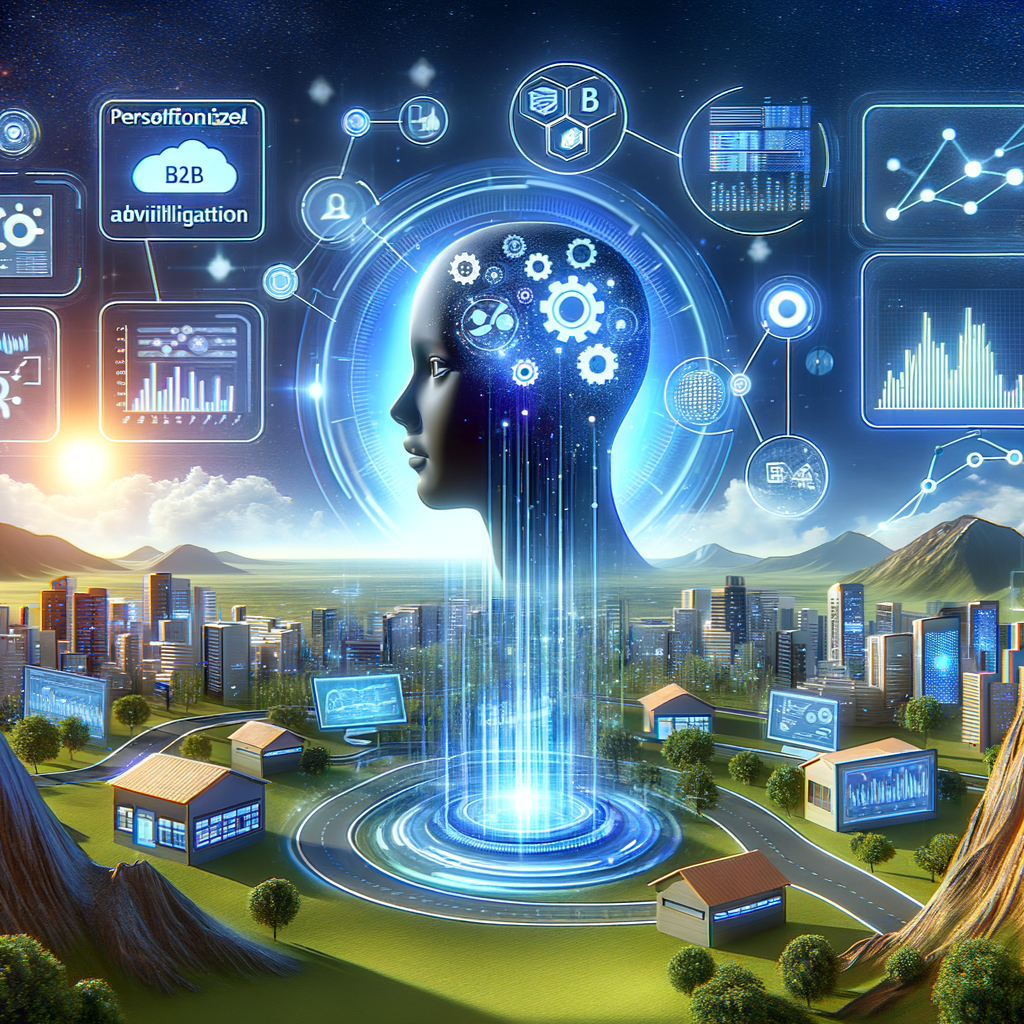B2B marketing is challenging. You’re connecting with sophisticated buyers making complex decisions. However, artificial intelligence in B2B marketing offers new ways to engage these buyers and boost growth.
This isn’t about replacing humans; it’s about empowering marketing teams with AI tools for personalized campaigns and smarter insights. If you’re a B2B marketer curious about AI, this post explores practical applications of artificial intelligence in B2B marketing and how it can elevate your results.
AI-Powered B2B Marketing: Use Cases and Benefits
AI is more than just a marketing tool; it’s transforming how B2B marketers work. It’s proving to be quite the ai tool by helping streamline many content creation processes, providing valuable customer insights, and enhancing marketing automation, leading to a significant competitive advantage.
Content Creation and Optimization
Creating compelling content is crucial, but demands time. AI marketing tools, like natural language processing (NLP) for content generation, can assist with various content formats—from blog posts and website copy to social media updates. While human oversight remains essential, AI can handle content repurposing, allowing content marketers to focus on more strategic tasks.
A study by BCG Henderson Institute and Harvard Business School found that integrating AI machine learning into business yields 40% higher quality results and 25% faster output. AI tools, like Jasper and Copy.ai, can expedite content creation. AI also improves SEO optimization through better keyword targeting and other AI marketing tools, helping businesses attract prospects.
Predictive Analytics for Smarter Decisions
Data is essential in B2B. Predictive analytics, powered by AI, provide deeper customer behavior insights. This empowers smarter decisions, optimized budget allocation across the right marketing channels, and accurate lead qualification.
Personalized Experiences at Scale
Personalization is vital. AI enables precise audience segmentation and personalized experiences. AI can even identify and recommend new segments that resemble top clients. Tailored messaging replaces generic content.
Tools like Khoros facilitate personalized customer journeys. This ensures every interaction feels individual.
Artificial Intelligence in B2B Marketing: Real-World Examples
Let’s explore successful AI implementations and their positive impact on B2B marketing strategies and marketing campaigns.
Khoros and 6sense: Personalization Power
Khoros, a customer engagement platform, partnered with 6sense to personalize website experiences. They leveraged AI-powered intent data and behavioral data. This led to doubled website visits and a fourfold increase in demos booked.
Drift: Conversational AI That Converts
Drift utilizes conversational AI for engaging website chats. This boosts engagement and often improves lead conversion. Conversational AI tools are available 24/7. These chatbots are increasingly important given customers’ preferences.
Studies indicate that 74% of consumers prefer chatbots for quick answers and browsing. Conversational AI addresses this demand. They enhance online presence and create personalized experiences.
Addressing Common Concerns about AI in B2B Marketing
Marketers have valid concerns about AI adoption, including job displacement and cost. Let’s address these anxieties.
The Human Element
AI empowers marketers; it doesn’t replace them. Human creativity, strategic thinking, and empathy remain crucial. AI helps create content and streamline marketing processes, allowing for more focus on strategy.
This shift demands long-term vision from businesses and measurement of long-term customer lifecycle outcomes. Businesses need to focus on customer experience and foster better cross-departmental data collection. This approach will ensure cohesive marketing campaigns and deeper insights.
Data Privacy and Security
AI necessitates ethical data handling. Safeguarding sensitive information is paramount. Marketers must adhere to data protection regulations and implement robust security measures across all channels.
AI plays a significant role in cybersecurity and data protection. AI automates compliance checks, improves workflow efficiency, and enables humans to concentrate on data validation, testing, and reporting across departments. This ensures secure data management throughout the organization.
Cost and Implementation
AI adoption doesn’t have to be costly. Numerous affordable AI marketing tools exist. Start with freemium options for testing. Focus on 1-2 key applications initially. Gradually incorporate more AI functionalities as you gain experience.
Artificial Intelligence in B2B Marketing: Getting Started
If you’re a business owner unsure where to begin with AI, here’s a guide:
- Identify Your Challenges: Pinpoint your biggest marketing hurdles and most pressing needs to guide AI tool selection.
- Start Small: Begin with a limited set of AI tools addressing specific needs. Scale gradually as your team gains comfort and expertise with these new marketing tools.
- Set Goals: Define clear, measurable objectives for AI implementation. This could include increased leads, better conversion rates, and enhanced customer engagement.
- Don’t Panic: Approach AI adoption strategically. It’s a valuable tool for improvement, not a cause for alarm.
FAQs about artificial intelligence in b2b marketing
How is AI used in B2B marketing?
AI optimizes various B2B marketing processes, from targeted campaigns and lead identification to ad spending and SEO. AI-driven insights also provide enhanced customer demand predictions, further improving marketing strategies.
What is an example of AI in B2B?
Drift exemplifies AI’s potential in B2B. Its conversational AI facilitates personalized website engagement. This efficient approach enhances lead qualification and improves customer lifetime conversion rates by providing tailored sales enablement.
What applications will artificial intelligence be used for in the B2B industry?
AI offers wide-ranging applications in B2B, from sales and marketing to product design, operations, and compliance. Generative AI helps create content, streamline operations, improve lead qualification, and tailor sales materials. Many Fortune 500 companies are incorporating AI solutions into their workflows to stay ahead of future trends and optimize sales enablement. AI is revolutionizing sales teams and sales enablement with tailored sales materials and lead qualification insights.
Do 64% of B2B marketers consider AI to be valuable in their marketing strategy?
While some sources cite this statistic, more validation is needed. While it’s generally recognized that marketing automation and data-driven insights are valuable, precise adoption rates and satisfaction among B2B marketers regarding AI are still emerging. Established research, such as a study from Capgemini, highlights a high percentage of executives viewing generative AI as a major driver of sales enablement and modern sales approaches.
Conclusion
Artificial intelligence in B2B marketing is a game-changer. It offers valuable opportunities for businesses of all sizes. AI is improving daily operations across various industries. Early adopters will undoubtedly continue gaining an edge. Companies that are learning, adapting and utilizing these AI machine learning tools will succeed in the marketing efforts. Companies that can embrace AI tools early and experiment, measure their results with different ai models will be ahead of the competition when other marketers are just starting to use machine learning. Focusing on the specific business goals such as increasing efficiency in lead qualification, using natural language processing for point ai blog posts creation, running ai marketing campaigns and creating personalized customer experiences can lead to the creation of long-term customer relationships with reduced cost.






